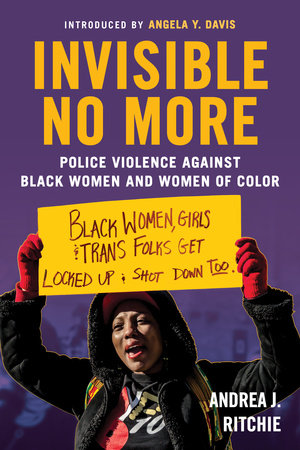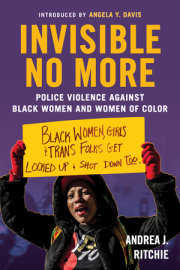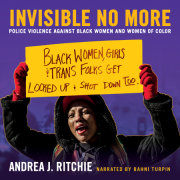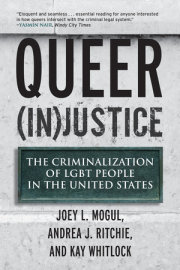“In clear, urgent prose, police-misconduct attorney Ritchie (Say Her Name: Resisting Police Brutality Against Black Women, 2015, etc.) shines an eye-opening spotlight on women of color targeted by police violence, a demographic that is not often well-represented in the media. She begins her discourse with history, discussing the controlling dynamic of slavery and colonization. The author then addresses more contemporary and vexing issues involving the aggressive enforcement of minor offenses and the rogue street policing of young women, disabled people, and gender-nonconforming people of color...She shares her impressions of the abuses of Native women protesting the Dakota Access Pipeline as well as...of Sandra Bland, Eleanor Bumpurs, and Kayla Moore, a black trans woman who died at the hands of transphobic police officers. Ritchie further details more personal stories of women affected by racial profiling, unsubstantiated criminalization, and rampant abuse...Dense, comprehensive arguments certain to bring awareness to the epidemic of police brutality against historically vulnerable...groups.”
—Kirkus Reviews
“Ritchie is not content with compiling a list of incidents. She challenges readers to organize and demand solutions that provide transparency and accountability. The systemic police exploitation of women and girls in marginalized communities will not cease without changes to the very structure of policing. Ritchie’s focused study and call to action is an essential work.”
—Booklist, Starred Review
“Invisible No More hardly restricts itself to the past. Indeed, what makes the book so bracing isn’t just the central thesis, which might feel already familiar in the era of Black Lives Matter. Rather, the book’s central power lies in how it manages to highlight a full history of state violence aimed at women of color, and how indelibly that history informs present-day interactions with law enforcement.”
—Pacific Standard
“Invisible No More deserves a standing ovation. It’s a passionate, incisive critique of the many ways in which women and girls of color are systematically erased or marginalized in discussions of police violence. The stories told here will haunt, inspire, and challenge you to reimagine justice by moving the experience of Black women and girls from the margins to the center.”
—Michelle Alexander, author of The New Jim Crow
“Invisible No More is a necessary intervention in the literature on policing. Ritchie moved me from page one with layered, thoughtful, and well-researched storytelling describing the multiple ways women of color are impacted by criminalization, begging the question of how their stories have been neglected and calling on all of us to make them visible. The insights revealed by these experiences, if heeded, will undoubtedly transform the course of history.”
—Opal Tometi, cofounder of Black Lives Matter and executive director of Black Alliance for Just Immigration
“With a profound sense of urgency and deep compassion, combining her keen instincts as a legal scholar and her work as an antiviolence activist, Andrea Ritchie brings long overdue attention to the policing of Black women and other women of color such that their stories are indeed invisible no more. All of us must recalibrate our activist responses to the pernicious state violence used to maintain structural racism, heteropatriarchy, transphobia, class oppression, and other manifestations of injustice in ways that reflect our now deepened understanding of how police violence affects Black women and women of color.”
—Beth E. Richie, author of Arrested Justice: Black Women, Violence, and America’s Prison Nation
“Invisible No More is a pathbreaking, timely, and powerful exposé of police violence against Black women and women of color written by a leading advocate for race, gender, and queer justice. Andrea Ritchie not only explains with clarity why this policing constitutes systemic and structural violence that is at once racialized and gendered but also shows that resisting it requires centering the experiences of marginalized women. Essential reading for everyone committed to working for a world free of state violence.”
—Dorothy Roberts, author of Killing the Black Body: Race, Reproduction, and the Meaning of Liberty
“Invisible No More is the most recent book by the brilliant Black feminist legal scholar, writer, and activist Andrea Ritchie, in which she maps the brutal history of police violence against Black, Indigenous, and other women of color in what is now the United States, countering the erroneous notion that men are the only or primary victims of such violence. From settler-colonial atrocities and the school-to-prison pipeline to the experiences of transgender women, Ritchie confronts us with a set of realities too vivid to ignore. Invisible No More is a hard book to read, but it is a necessary read, combining cutting-edge analyses with stories, including the author’s, that will anger, educate, and inspire you to act.”
—Barbara Ransby, historian, activist, author of Ella Baker and the Black Freedom Movement, and president of the National Women’s Studies Association
“This is a terrifying book, not only because it exposes the startling number of Black women whose lives were cut short by state-sanctioned violence or the fatal consequences of policing Black women’s bodies. What is most disturbing is how little we know about these women and their stories. It is astounding how quickly women of color disappear when we memorialize the ‘many thousands gone.’ But thanks to Andrea Ritchie’s thorough research and raw storytelling—capturing both the horrors and the resistance—we can finally begin to #sayhername and end the state’s war on women of color once and for all.”
—Robin D. G. Kelley, author of Freedom Dreams: The Black Radical Imagination
“This long-awaited book from Andrea Ritchie, the leading expert on police violence against women of color, is well worth the wait. This book is quite simply stunning. Ritchie’s analysis deeply challenges both antipolicing and antiviolence movements to expand the scope of their work to address how policing operates through gender, race, disability, and colonialism. Offering a rich genealogy of police violence, Ritchie demonstrates that, both historically and today, gender violence is central to policing. Her attention to the myriad ways policing impacts Black women and women of color is brilliant. A crucial and paradigm-shifting book.”
—Andrea Smith, author of Conquest: Sexual Violence and American Indian Genocide
“With Invisible No More, Andrea Ritchie has produced a work of great scope and depth, tightly documented and deeply moving. Ritchie spans multiple centuries, nations, issues, and identity lenses to lay bare the effects of violent policing on women of color. She authentically and skillfully centers Black women while seeding the ground for alliances among women of color, and she gives us a thorough consideration of the experiences of women with disabilities. Most importantly, she introduces us to a generation of fighters we can follow, support, and lift up.”
—Rinku Sen, executive director of Race Forward
“Andrea Ritchie’s Invisible No More is a powerful affirmation of why our movement has to be rooted in exposing and advocating for Black women and girls who experience state brutality. We saw with cases such as those of Sandra Bland, Gynnya McMillen, Kayla Moore, and Joyce Curnell how mainstream media and policymakers ignore police brutality against Black women. Invisible No More is a powerful tool that analyzes our criminal justice system’s practices and patterns that maintain this problem. Through her writing, Ritchie has created the opportunity to do more than amplify police violence against Black women and to enable Color of Change and other movement organizations to also identify the intervention points where we can make real change happen in order to create a just and safe society for all Black people, especially cis and trans women and girls.”
—Rashad Robinson, executive director of Color of Change
“Andrea Ritchie’s work is a vital contribution to our understanding of policing and criminalization, exposing how women, trans, and gender-nonconforming people are targeted. Ritchie’s intersectional analysis exposes how policing operates off racialized-gendered structures that target people with disabilities, Black mothers, Indigenous women, and others made hypervisible and/or invisible by white gender norms. This is the tool we need in this exact moment, as grassroots resistance to police violence grows alongside an increasing emboldenment of racist law enforcement.”
—Dean Spade, author of Normal Life: Administrative Violence, Critical Trans Politics, and the Limits of Law
“Invisible No More is more than a book about police accountability; it is an important read that interrogates policing practices at the intersections of race, gender, sexuality, and ability. By examining how culpability has been constructed to facilitate the dehumanization and criminalization of women and girls of color, Ritchie skillfully presents the transgenerational trauma produced by centuries of overt and covert state violence against cis and transgender women and girls of color in the United States.”
—Monique W. Morris, author of Pushout: The Criminalization of Black Girls in Schools
“Invisible No More is not only a hard testament to the true nature of policing in the United States upon Black, Indigenous, and other women of color but also to our foremothers’ relentless resistance; to their gifts of truth, kinship, and radical love; and to their will to see us and our own freedom dreams come to fruition.”
—Paulina Helm-Hernandez, former codirector of Southerners on New Ground
“Invisible No More is a thorough and compelling documentation of police abuses against and human rights violations experienced by Black, Latinx, and Indigenous women, other women of color, and trans women and men that should pierce the conscience of even those most resistant to calls for police accountability. Most importantly, it serves as a powerful call to action to all who care about women—that we must demand a complete rethinking of what justice is for those who have been denied, and that we must commit to fighting for that vision together. I’m grateful to Andrea Ritchie for her personal courage in telling the stories of these women and her own story, and assuring that none will be forgotten.”
—Margaret Huang, executive director of Amnesty International
“Invisible No More thoroughly demonstrates why we must radically reframe the criminal justice stories that too often present the myopic view that the torture and inhumane deprivation of life of men of color are the only pressing issues in the criminal (in)justice system and prison industrial complex. Andrea Ritchie’s meticulous documentation and masterful writing emphasize why it is imperative that we examine the roles of race, gender, gender identity, and sexuality when we talk about and work on eradicating racial profiling, police brutality, mass incarceration, and other forms of state-sanctioned violence in the United States. Invisible No More is an invaluable organizing resource that is required reading for anyone interested in violence against women, criminal justice, and radical social change.”
—Aishah Shahidah Simmons, producer/writer/director of NO! The Rape Documentary
“This compelling, essential, and deeply informed book exposes the impact of policing, criminalization, and violence on the lives of Black women and women of color in the United States. Ritchie is at once eloquent and forensic in centering the experience of Black women of all genders and colors to build an urgent argument to reconstitute the policing function itself.”
—Urvashi Vaid, attorney and author of Irresistible Revolution: Confronting Race, Class, and the Assumptions of LGBT Politics
“Reading this book is hard but critically important—and essential for our political education. The stories and timeline are both well researched and needed, and they taught me things I wasn’t aware of and am grateful to learn. If Andrea Ritchie hadn’t documented these histories, I’m afraid no one else would have.”
—Coya White-Hat Artichoker (Lakota), founding member of the First Nations Two Spirit Collective
“In Invisible No More, Andrea Ritchie draws from her experiences as an organizer, researcher, activist, agitator, immigrant, and survivor to paint a tear- and blood-splattered portrait that illustrates with depth and clarity the shared struggles of women of color in the United States of America. Ritchie, however, doesn’t rest on that commonality. With painstaking care, she explores difference, privilege, and the layers of oppression that often mask the specific struggles of Indigenous, immigrant, and Black women in a country that hates us for our freedom. Ritchie speaks unapologetically from the margins, tackling white supremacy, police brutality, gender, and class with a deft hand and a full heart. She makes it abundantly clear that women of color are under constant threat of violence from all corners and always have been. Ritchie’s work is invaluable to me as a journalist, and with this book, she continues to show that writing is resistance and that if liberation is our true goal, then Black women and girls can be invisible no more.”
—Kirsten West Savali, senior writer and editor at TheRoot.com








